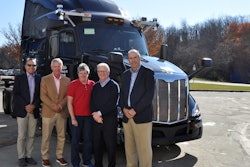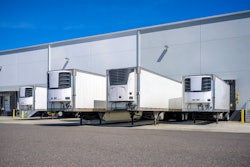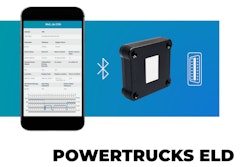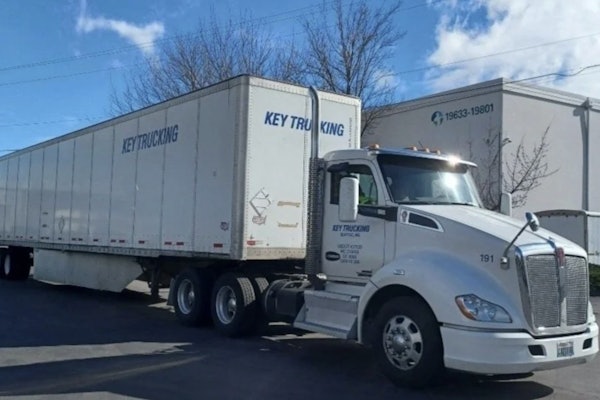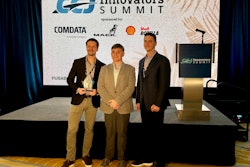GOP presidential candidate Vivek Ramaswamy Thursday evening got his first run "on a truck on a highway" in Minnesota-based owner-operator Mike Steinbrink's 2014 Kenworth T660. The Kenworth bore the insignia of CDL Drivers Unlimited, who facilitated the short run to the site of a forum with the candidate -- the Iowa 80 Truck Stop in Walcott, Iowa.
Mere weeks ahead of Iowa's first-in-the-nation caucuses, and after a bit of a delay, CDLDU leader Lee Schmitt facilitated a conversation with Ramaswamy that dug into regulatory details in a manner seldom seen from presidential candidates.
"The more I learn here," Ramaswamy said, "the more drawn in I am." Regulatory pressures in trucking of the last decades -- from the many changes to the hours of service rules to their automated enforcement in the electronic logging device mandate and the current move to mandate speed limiters -- he viewed as a "microcosm of the kind of issues we face in other sectors in our economy. ... Part of what I’m trying to do is draw attention to a sector of our economy that every other candidate in both parties has ignored."
From a 10,000-foot view, Ramaswamy endorsed the notion that leadership at the Department of Transportation and Federal Motor Carrier Safety Administration should be building on lived experience in the working world they're tasked to regulate. Other DOT agencies in the Federal Aviation Administration and Federal Railroad Administration, at least, have respectively a private pilot and an attorney with direct experience of the rail industry at the helm, he noted.
Not so the FMCSA, he said, or DOT itself, which he said "should be led by someone with actual expertise. ... That's where presidents ... have failed" trucking. The federal government needs leaders who won't "turn people into machines" with regulations that limit "the power of discretion and judgment."
Ramaswamy referenced his layman's view of the ELD in Steinbrink's rig, for instance, that the ticking time clock "could cause people to be more likely to drive less safe" as "you’re under the gun" on time, he said, calling the ELD mandate a classic case of someone working behind a desk in a government that is "making the problem it was supposed to solve worse."
Responding to the notion of a speed-limiting device mandate, he emphasized the connection between the two, with ELDs increasing the risks of speeding, and potentially being used to retroactively enforce speed rules during audits, as Schmitt had suggested.
"Now you're damned if you do and damned if you don’t," Ramaswamy said. "What happens if everybody says, 'We're done'? If I were in that position, it would drive me crazy."
He pledged to roll back tech mandates in favor of "human beings who can make judgments. We’re human beings with agency, not just riding the tectonic plates of higher programmed forces."
The ELD in Steinbrink's truck -- "We don’t need to take that to the next level" with speed-limiting-device mandates, he said.
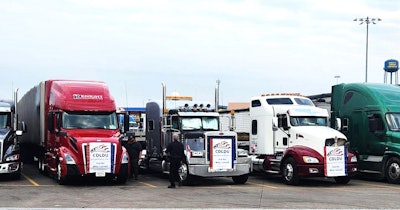 Steinbrink's T660 (right) with other CDLDU member rigs parked up at Iowa 80.
Steinbrink's T660 (right) with other CDLDU member rigs parked up at Iowa 80.
[Related: Another reason to fight traffic tickets: Convictions can now impact independents' safety ratings]
Restoration of drivers' judgment and agency could also, he said, help accomplish one among a series of goals outlined in a draft series of trucking policy positions circulated ahead of the event by the campaign. Namely, refocus the federal government's efforts more firmly away from recruitment to trucking and to retention in the industry.
The United States doesn't "have a trucker shortage. What we really have is a retention problem," he said. "If everybody just leaves an industry, and we aren’t taken good enough care of … it's going to hurt."
Another policy position outlined in the candidate's opening included an appreciation of the brokered-freight-transparency issue. Truckers "desire to have transparency from the broker ... reaping margins at the expense of truckers, [who] should be able to be auditing the people they're doing business with," he said.
And though the fraud/theft problem in brokered freight markets has seen some significant federal attention particularly within the last year, the campaign's policy outline urged further enforcement. Freight fraud and cargo theft each "jeopardizes the economic well-being of CDL drivers, especially those working as independent contractors," according to the outline.
[Related: Fighting double-brokering fraud: Prevention, ways to elevate enforcement]
Other policy areas highlighted:
- Independent contractor status -- Ramaswamy touched on his feeling that independent contractor status should be protected for those who want it. With the pressures coming from California's AB 5 contractor law, his policy outline called for a federal standard to be made of the Internal Revenue Service's "more lenient, 20-factor test ... in determining independent contractor status -- coupled with common-sense crackdowns on willful employee misclassification."
- The parking shortage -- The money flows to parking projects, but to many truckers, as Schmitt relayed a question from the audience, a lot of the spending seems misdirected. "Writing a check doesn’t automatically make a parking spot appear," Ramaswamy said. "Look at what the underlying, real problem actually is."
- Hours of service -- The candidate's policy paper makes the connection between parking scarcity and hours, with the search for parking pushing many over HOS limits: "Without acting on the severe lack of parking, DOT undermines its stated goal of safety and the utility of HOS restrictions." The outline recommends a "holistic study of HOS regulations to arrive at an evidence-based balance between unleashing the trucking industry and protecting all drivers’ safety."
In closing, Schmitt reminded the candidate that three-quarters of all freight in the United States moves by truck, and well more than half of that freight is under the tutelage of carriers with 100 trucks or fewer, most of them "mom-and-pop carriers" and owner-operators.
"Wherever this leads," Schmitt said, "keep in mind it’s the owner-operators and the small companies and businesses running this country."
"Don't get too busy," Ramaswamy said, thanking Schmitt as the event ended and the two shook hands. "We might have a job that we need you to do."
Hear more from the forum in the livestream replay embedded below, touching on training, English-language requirements of CDL drivers and bedrock safety issues, among others. The event gets rolling in the Iowa 80 theater at about the 10-minute mark.


